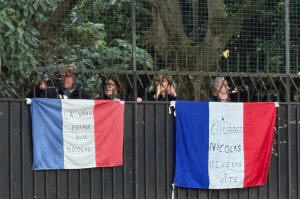Former French President Sarkozy begins a 5-year prison sentence for
campaign finance conspiracy
[October 22, 2025]
By SYLVIE CORBET and MASHA MACPHERSON
PARIS (AP) — Former French President Nicolas Sarkozy entered a prison in
Paris on Tuesday to begin serving a 5-year sentence for a criminal
conspiracy to finance his 2007 election campaign with funds from Libya —
a historic moment that makes him the first ex-leader of modern France to
be imprisoned.
Sarkozy, 70, was greeted by hundreds of supporters when he walked out of
his Paris home earlier in the day hand-in-hand with his wife,
supermodel-turned-singer Carla Bruni-Sarkozy. He embraced her before
getting into a police car.
Minutes later, the vehicle passed through the gates of the notorious La
Santé prison — where Sarkozy will now serve his sentence in solitary
confinement.
Sarkozy was convicted last month for criminal conspiracy in a scheme to
finance his 2007 election campaign with funds from Libya.
He contests both the conviction and a judge’s unusual decision to
incarcerate him pending appeal. His lawyers said Tuesday that they filed
an immediate request for his release.
A show of defiance
“It’s an ominous day for him, for France and for our institutions,
because this incarceration is a disgrace,” Sarkozy’s lawyer Jean-Michel
Darrois told reporters soon after his incarceration.
In a show of defiance and while on his way to the prison, Sarkozy
released a statement on social media declaring that “an innocent man”
was being locked up.
“I will continue to denounce this judicial scandal," he wrote. "The
truth will prevail.”

Sarkozy told Le Figaro newspaper that he would bring three books in
prison — the maximum allowed — including Alexandre Dumas’ “The Count of
Monte Cristo,″ in which the hero escapes from an island prison before
seeking revenge. He also picked a biography of Jesus Christ.
“I’m not afraid of prison. I’ll hold my head high, including in front of
the doors of La Santé,” he told La Tribune Dimanche newspaper last week.
“I’ll fight till the end.”
Sarkozy has repeatedly said he is the victim of “a plot” staged by some
people linked to the Libyan government and denounced the Sept. 25
verdict as a “scandal.”
Solitary confinement
Sarkozy’s lawyers said he will be kept away from all other prisoners for
security reasons. They said he packed a bag with a few sweaters because
the prison is cold and earplugs because it’s noisy.
Christophe Ingrain, another of Sarkozy’s lawyers, denounced “a serious
injustice."
"It’s a very difficult time, but the president has stood strong,"
Ingrain said. “He doesn’t complain, hasn’t asked for anything, no
special treatment.”
Solitary confinement implies that Sarkozy will never see other inmates
and will spend most of his time alone in his cell, Ingrain said.
He will be allowed to go outdoors one hour per day alone in the prison
yard and to get three visits per week from his family, Ingrain said,
adding that he is planning to write a book about his prison experience.
An outpouring of support for the ex-president
Sarkozy's journey from the presidential Elysée Palace to La Santé prison
has captivated France.
After leaving their home, Sarkozy and his wife walked slowly to join
family members, including his children and grandchildren, outside his
home.
[to top of second column]
|

People stand behind French flags with inscription reading "Courage
Nicolas, come back soon", right, and "True France with Nicolas"
outside former French President Nicolas Sarkozy's home, Tuesday,
Oct. 21, 2025 in Paris. Former French President Nicolas Sarkozy
heads to prison to serve time for a criminal conspiracy to finance
his 2007 election campaign with funds from Libya. (AP Photo/Masha
Macpherson)

“I’m very proud to share his name, and very proud of how he’s
reacting," said his brother, Guillaume Sarkozy. "I’m truly convinced
that he is innocent.”
Hundreds of supporters applauded and chanted “Nicolas, Nicolas” and
sang the French anthem. Two French flags were hung on a nearby
fence, with the words “Courage Nicolas, return soon” and “true
France with Nicolas.”
Parisian resident Virginie Rochon, 44, came in support of Sarkozy,
calling it “scandalous” to see ”a former president being taken away
while still presumed innocent.”
Another supporter, Véronique Maurey, 50, said “it’s just not
possible. And on top of that, calling it a ‘criminal conspiracy’
kind of makes all of us feel like criminals too because we voted for
him. It’s not right to say that."
Meeting with Macron
Embattled centrist President Emmanuel Macron hosted the conservative
Sarkozy at the presidential palace last week, explaining it was
“normal on a human level” to receive one of his predecessors in this
context.
On Tuesday, Macron said he would not comment on a justice decision.
“Nevertheless, it's normal that the image of a president being
imprisoned ... may prompt comments,” he said.
“We must distinguish emotion, including the legitimate emotion of
relatives and part of the country ... and the proper functioning of
justice," Macron added.
Sarkozy has been retired from active politics for years but remains
very influential, especially in conservative circles.
France’s top magistrate Rémy Heitz, Prosecutor-General at the Court
of Cassation, warned Tuesday about a risk of “hindering (justice)
serenity” and of “undermining the independence of judges,” including
when the justice minister — a former conservative who joined
Macron's party — plans to visit Sarkozy in prison.
“The goal for everyone must be serenity, to allow justice to truly
rule independently... free from any pressure,” Heitz said.
The Paris court ruled last month that Sarkozy would start to serve
prison time without waiting for his appeal to be heard, due to “the
seriousness of the disruption to public order caused by the
offense.”

The court said Sarkozy, as a presidential candidate and interior
minister, used his position “to prepare corruption at the highest
level” from 2005 to 2007, to finance his presidential campaign with
funds from Libya — then led by longtime ruler Moammar Gadhafi.
Under the ruling, Sarkozy was able to file a request for release to
the appeals court only once behind bars. Judges have up to two
months to process it.
___
Associated Press journalists Angela Charlton, Oleg Cetinic and
Nicolas Garriga in Paris contributed to this report.
All contents © copyright 2025 Associated Press. All rights reserved |